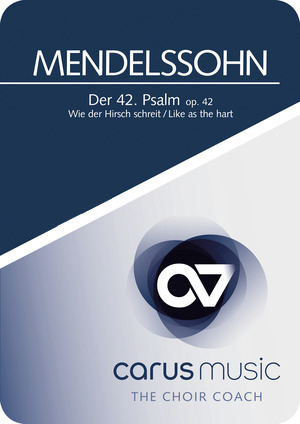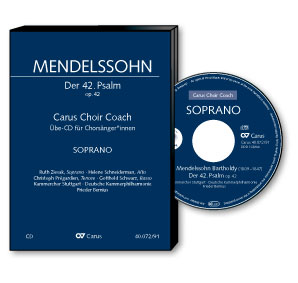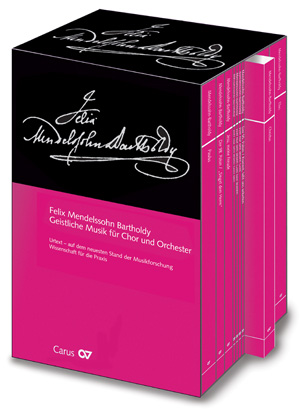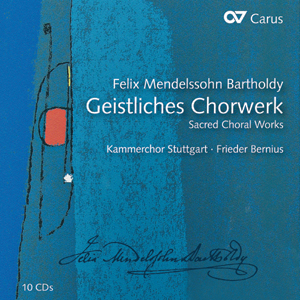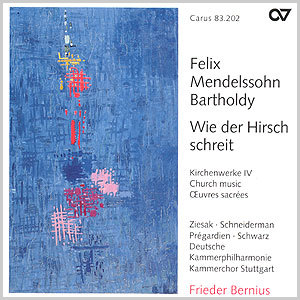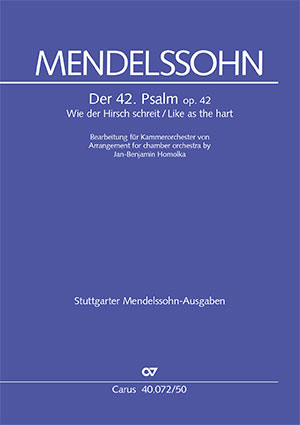Felix Mendelssohn Bartholdy Psalm 42
Like as the hart longs MWV A 15, 1837
- Scoring:
- Soli STTBB, Coro SATB, 2 Fl, 2 Ob, 2 Clt, 2 Fg, 2 Cor, 2 Tr, 3 Trb, Timp, 2 Vl, Va, Vc, Cb, Org
- Search for works with similar scoring
- Language:
- German/English
- Duration:
- 26 min
- Difficulty level:
- 1 2 3 4 5
- Biblical text:
- Ps 42
The Psalms inspired Mendelssohn throughout his working life, and, aside from a cappella settings, he left behind five great orchestral Psalms. Schumann assesed in 1837 that Psalm 42 was the "highest point that he [Mendelssohn] reached as a composer for the church. Indeed the highest point recent church music has reached at all."
Thanks to an arrangement by Homolka (Carus 40.072/50), it is possible to perform the work in smaller settings.
 View
View
 Listen
(7)
Listen
(7)
- Coro: Wie der Hirsch schreit
- Recitativo, Aria: Meine Tränen
- Aria: Meine Seele dürstet
- Coro: Was betrübst du dich
- Recitativo: Mein Gott, betrübt ist meine Seele
- Quintetto: Der Herr hat des Tages
- Schlußchor: Was betrübst du dich, meine Seele
 Practise
Practise
-
-
Practice aids voice part soprano
- Coro: Wie der Hirsch schreit (Choir Coach)
- Coro: Wie der Hirsch schreit (Choir Coach, Slow mode)
- Aria: Meine Seele dürstet (Choir Coach)
- Aria: Meine Seele dürstet (Choir Coach, Slow mode)
- Coro: Was betrübst du dich (Choir Coach)
- Coro: Was betrübst du dich (Choir Coach, Slow mode)
- Schlußchor: Was betrübst du dich, meine Seele (Choir Coach)
- Schlußchor: Was betrübst du dich, meine Seele (Choir Coach, Slow mode)
-
Practice aids voice part alto
- Coro: Wie der Hirsch schreit (Choir Coach)
- Coro: Wie der Hirsch schreit (Choir Coach, Slow mode)
- Aria: Meine Seele dürstet (Choir Coach)
- Aria: Meine Seele dürstet (Choir Coach, Slow mode)
- Coro: Was betrübst du dich (Choir Coach)
- Coro: Was betrübst du dich (Choir Coach, Slow mode)
- Schlußchor: Was betrübst du dich, meine Seele (Choir Coach)
- Schlußchor: Was betrübst du dich, meine Seele (Choir Coach, Slow mode)
-
Practice aids voice part tenore
- Coro: Wie der Hirsch schreit (Choir Coach)
- Coro: Wie der Hirsch schreit (Choir Coach, Slow mode)
- Coro: Was betrübst du dich (Choir Coach)
- Coro: Was betrübst du dich (Choir Coach, Slow mode)
- Quintetto: Der Herr hat des Tages (Choir Coach, Tenore 1)
- Quintetto: Der Herr hat des Tages (Choir Coach, Slow mode, Tenore 1)
- Quintetto: Der Herr hat des Tages (Choir Coach, Tenore 2)
- Quintetto: Der Herr hat des Tages (Choir Coach, Slow mode, Tenore 2)
- Schlußchor: Was betrübst du dich, meine Seele (Choir Coach)
- Schlußchor: Was betrübst du dich, meine Seele (Choir Coach, Slow mode)
-
Practice aids voice part basso
- Coro: Wie der Hirsch schreit (Choir Coach)
- Coro: Wie der Hirsch schreit (Choir Coach, Slow mode)
- Coro: Was betrübst du dich (Choir Coach)
- Coro: Was betrübst du dich (Choir Coach, Slow mode)
- Quintetto: Der Herr hat des Tages (Choir Coach, Basso 1)
- Quintetto: Der Herr hat des Tages (Choir Coach, Slow mode, Basso 1)
- Quintetto: Der Herr hat des Tages (Choir Coach, Basso 2)
- Quintetto: Der Herr hat des Tages (Choir Coach, Slow mode, Basso 2)
- Schlußchor: Was betrübst du dich, meine Seele (Choir Coach)
- Schlußchor: Was betrübst du dich, meine Seele (Choir Coach, Slow mode)
 Additional material
Additional material
- Purchase additional material as a download product.
-
 text (without music) for download, html file, Singing text, english translationhtml file, Singing text, english translation (Sample)
text (without music) for download, html file, Singing text, english translationhtml file, Singing text, english translation (Sample)1. Coro (SATB)
As the hart longs for streams of water,
O God, so my spirit longs for thee.2. Aria (Solo S)
For my spirit thrists after God,
my God, the Lord of all living.
O when shall I come before him,
so that mine own eyes may see him?3. Recitativo (Solo S)
And my tears have been all my food both day and night,
while they daily come and ask me: Where is now your God?
These things I now remember,
as I pour out my heart in prayer to him.Allegro assai (Solo S e Coro)
For I would have gone out gladly with the people
and with them would go up to God’s own temple
with rejoicing and thanksgiving,
with all the people on the feast day.... -
 text (without music) for download, html file, Singing text, originalhtml file, Singing text, original (Sample)
text (without music) for download, html file, Singing text, originalhtml file, Singing text, original (Sample)1. Coro (SATB)
Wie der Hirsch schreit nach frischem Wasser,
so schreit meine Seele, Gott, zu dir.2. Aria (Solo S)
Meine Seele dürstet nach Gott,
nach dem lebendigen Gotte.
Wann werde ich dahin kommen,
dass ich Gottes Angesicht schaue?3. Recitativo (Solo S)
Meine Tränen sind meine Speise Tag und Nacht,
weil man täglich zu mir saget: Wo ist nun dein Gott?
Wenn ich dess’ inne werde,
so schütte ich mein Herz aus bei mir selbst.Allegro assai (Solo S e Coro)
Denn ich wollte gern hingehen mit dem Haufen
und mit ihnen wallen zum Hause Gottes,
mit Frohlocken und mit Danken
unter dem Haufen, die da feiern.4. Coro (SATB)
Was betrübst du dich, meine Seele,
... -
 text (without music) for download, html file, Introductory text, Frenchhtml file, Introductory text, French (Sample)
text (without music) for download, html file, Introductory text, Frenchhtml file, Introductory text, French (Sample)Texte du livret du CD Carus 83.202
Thomas Schmidt-Beste
Traduction (abrégé) : Jean Paul MénièreLa musique spirituelle pour chœurs occupe une place importante dans la production de Felix Mendelssohn Bartholdy (1809–1847). Le catalogue de ses œuvres ne compte pas moins de 67 compositions, publiées ou non, qui vont de très simples et brèves pièces pour chœurs jusqu’aux deux oratorios monumenteaux Paulus et Elias. Il est facile de comprendre cet aspect de la production du compositeur lorsqu’on jette un bref regard sur sa biographie : Après l’abandon de la religion juive et la conversion de la famille Mendelssohn au christianisme en 1816 (d’abord les enfants, les parents en suivent 1822) le compositeur grandit dans le milieu culturel et musical de Berlin, fortement imprégné par le protestantisme. Son professeur, Carl Friedrich Zelter, jouait, en outre, en tant que directeur de la Singakademie, Berlin, à laquelle appartint également le jeune
... -
 text (without music) for download, html file, Introductory text, Englishhtml file, Introductory text, English (Sample)
text (without music) for download, html file, Introductory text, Englishhtml file, Introductory text, English (Sample)Text from the CD Carus 83.202
Thomas Schmidt-Beste
Translation (abridged): John CoombsSacred choral music occupies an important place among the works of Felix Mendelssohn Bartholdy (1809–1847); the catalogue of his sacred compositions includes no fewer than 67 published and unpublished works, ranging from brief and straightforward choruses to the two monumental oratorios St. Paul and Elijah. A glance at the biography of the composer makes this understandable: following conversion to Christianity of the originally Jewish Mendelssohn family (the children were converted in 1816 and the parents in 1822) the composer grew up in the Protestant-influenced musical culture of Berlin. His teacher Carl Friedrich Zelter, as director of the Berlin Singakademie (to which the young Mendelssohn belonged), was one of the leading figures in the movement of that period whose aim was to breathe new life into the “classical” art of the old
... -
 text (without music) for download, html file, Introductory text, Germanhtml file, Introductory text, German (Sample)
text (without music) for download, html file, Introductory text, Germanhtml file, Introductory text, German (Sample)Booklet-Text der CD Carus 83.202
Thomas Schmidt-Beste
Im Schaffen Felix Mendelssohn Bartholdys (1809–1847) nimmt die geistliche Chormusik einen großen Stellenwert ein – das Werkverzeichnis führt nicht weniger als 67 veröffentlichte und unveröffentlichte Werke auf, die von kurzen, ganz einfachen Chorsätzen bis zu den beiden monumentalen Oratorien Paulus und Elias reichen. Ein Blick auf die Biographie des Komponisten macht dies verständlich: Nach dem Übertritt der ursprünglich jüdischen Familie Mendelssohn zum Christentum – im Jahr 1816 erst der Kinder und 1822 dann der Eltern – wuchs der Komponist in der protestantisch geprägten Musikkultur Berlins auf; sein Lehrer Carl Friedrich Zelter war zudem als Leiter der Berliner Singakademie (deren Mitglied auch der junge Mendelssohn war) eine der treibenden Kräfte im Bestreben, die „klassische“ Kunst der alten Meister der Kirchenmusik in der Praxis zu neuem Leben zu erwecken. An erster Stelle standen hier die Werke
...
Contents
-
Composer
Felix Mendelssohn Bartholdy
| 1809-1847
-
Editor
Günter Graulich
| 1926The publisher, church musician and teacher Günter Graulich is one of the major personalities in German publishing of the post-war period. With his wife Waltraud he founded Carus-Verlag Stuttgart in 1972, which he built up from a 2-person family firm to a medium-sized business with around 60 employees. A trained church musician and Kantor for many years at the Matthäuskirche Stuttgart, he also directed the Motettenchor Stuttgart for 50 years. With his choir he made LP and CD recordings, and undertook numerous concert tours to other European countries and America. Personal details
Reviews
... Die Partitur ist hervorragend gesetzt und die Fassung ist mit Klavierauszügen und Chorpartituren der Originalversion kompatibel. Gustav Danzinger, Chor aktuell , 01/2021
…liegt hier eine gelungene, technisch hervorragend umgesetzte Bearbeitung vor, die dieses wunderbare Werk einem noch breiteren SängerInnen- und HörerInnenkreis adäquat präsentieren wird.
Tristan Meister, Chorzeit, 04/2021
Reviews on our website can only be submitted by customers with a registered user account. A check whether the rated products were actually purchased does not take place.
Frequent questions about this work
 There are no questions and answers available so far or you were unable to find an answer to your specific question about this work? Then click here and send your specific questions to our Customer Services!
There are no questions and answers available so far or you were unable to find an answer to your specific question about this work? Then click here and send your specific questions to our Customer Services!



